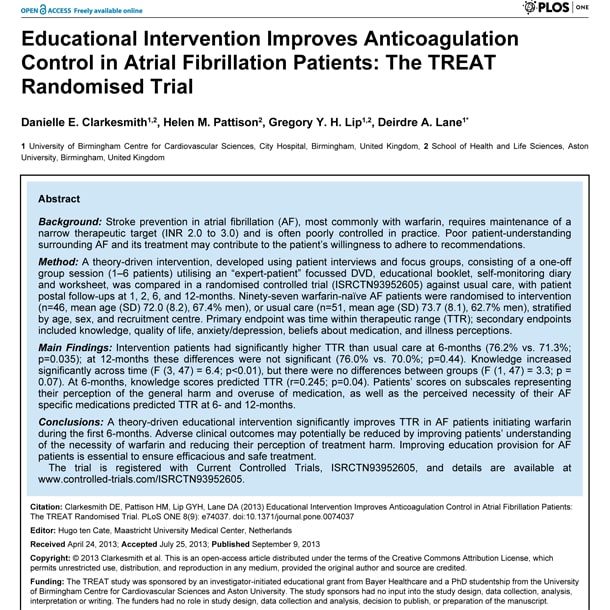Summary
Effective stroke prevention for atrial fibrillation patients requires anticoagulation either with a vitamin K antagonist, such as warfarin, or one of the new oral anticoagulants. Efficacy of warfarin requires maintenance of a narrow therapeutic target, which is often poorly controlled in practice due in part to a lack of understanding about treatment.
The team developed an intensive-educational intervention for AF patients. The intervention consists of a one-off group session and a DVD featuring patient interview clips discussing concerns about AF and oral anticoagulants. Compared to usual care the intervention led to significant improvements in patients’ understanding of the necessity of warfarin and reduced their perception of treatment harm.
Challenge
Atrial fibrillation (AF) is the leading cause of stroke. Evidence supports the use of oral anticoagulation for stroke prevention. In the UK, until 2012, this meant Warfarin, which requires patients to maintain a narrow therapeutic range (TTR), ideally for more than 70 per cent of the time. However, they often fail to maintain adequate time within TTR, reducing treatment efficacy. Research suggests that improving patients’ knowledge of AF and warfarin may help improve TTR.
Patients’ lack of knowledge presents a barrier to uptake and adherence. Their inaccurate perceptions may lead to non-adherence to medication. The team therefore wanted to develop an intervention which would improve warfarin control and patient knowledge about AF and OAC, aiding long-term adherence in AF patients.
Objectives
The TREAT study had two main objectives. Firstly, it aimed to develop a behavioural-educational intervention, in collaboration with patients, healthcare professionals, and patient organisations, for AF patients who were initiating warfarin for stroke prevention. Secondly, it hoped that the behavioural-educational intervention is effective in improving patients’ anticoagulation control (time in therapeutic range, or TTR) compared with usual care.
Solution
Information regarding AF and OAC was gathered from the European Society of Cardiology and NICE (2006) clinical guidelines. Methods of presenting information were piloted with patient focus groups. The key objective of the implementation study was to establish ‘expert’ patients’ preferred communication methods for the educational information, to ensure the final materials were patient-focused and accessible. Patients were asked to relay back the key message that the information was trying to convey. Staff also commented on the information. The most popular methods of presenting information were modified according to feedback.
Psychological theories about how patients view illness and their beliefs about medications were also used to inform intervention development. Behavioural change techniques allowing for patient self-monitoring, control of lifestyle recommendations and the formation of action plans for taking medication were also included. The intervention was tested in a randomised controlled trial against usual care (attendance at the anticoagulation clinic).
Results
The success of the behavioural-educational intervention was tested in a randomised controlled trial (the TRial of an Educational Intervention for patients with ATrial Fibrillation (TREAT) study). The results showed that it significantly improved the anticoagulation control (TTR) of AF patients initiating warfarin. The TREAT intervention not only provided information but gave patients a framework to make the necessary behavioural changes.
This intervention could significantly improve INR control for AF patients receiving warfarin both throughout the country and globally. Anticoagulation service teams could receive training on delivering the TREAT intervention, which could easily be incorporated into existing OAC services to enhance patients’ anticoagulation. Materials could be adapted to encompass other indications for warfarin such as VTE/DVT/valve replacement or for NOACs.
Learnings
Ensuring that the educational materials integrated theory, clinical guidelines and the patient perspective was a challenged. Appropriate materials were gathered from clinical guidelines and literature and drafts presented to patient focus groups. Whilst literature at the time of recommended the use of novel presentation of risk, such as pictograms, patients preferred traditional pie-charts. Patients should be included at each stage of development to ensure that the intervention and materials work for them.
Another challenge was recruiting patients, and patient attrition throughout follow-up on subsequent questionnaire assessments. It transpired that the burden of follow-up questionnaires was preventing patients from taking part, so brief questionnaires were used. Mixed methodology studies enable a patient-centred approach to developing and trialling of complex interventions.
Evaluation
TREAT significantly improved patients’ warfarin control, as shown by a higher time in the therapeutic INR range (TTR) for those in the intervention group. This indicates greater adherence to medication and lifestyle recommendations. At 12 months the percentage of TTR was slightly higher in the intervention group, suggesting a need to repeat the intervention.
Patient knowledge levels increased in both groups. Where AF and warfarin knowledge was sustained, patients were more likely to remain within the target therapeutic range.
There were significant differences between groups in the perception of the harm of medication; the intervention group viewed it as less harmful. Evidence suggested that patients perceive anticoagulation, particularly warfarin, as harmful. The TREAT intervention specifically educated patients about warfarin treatment.




